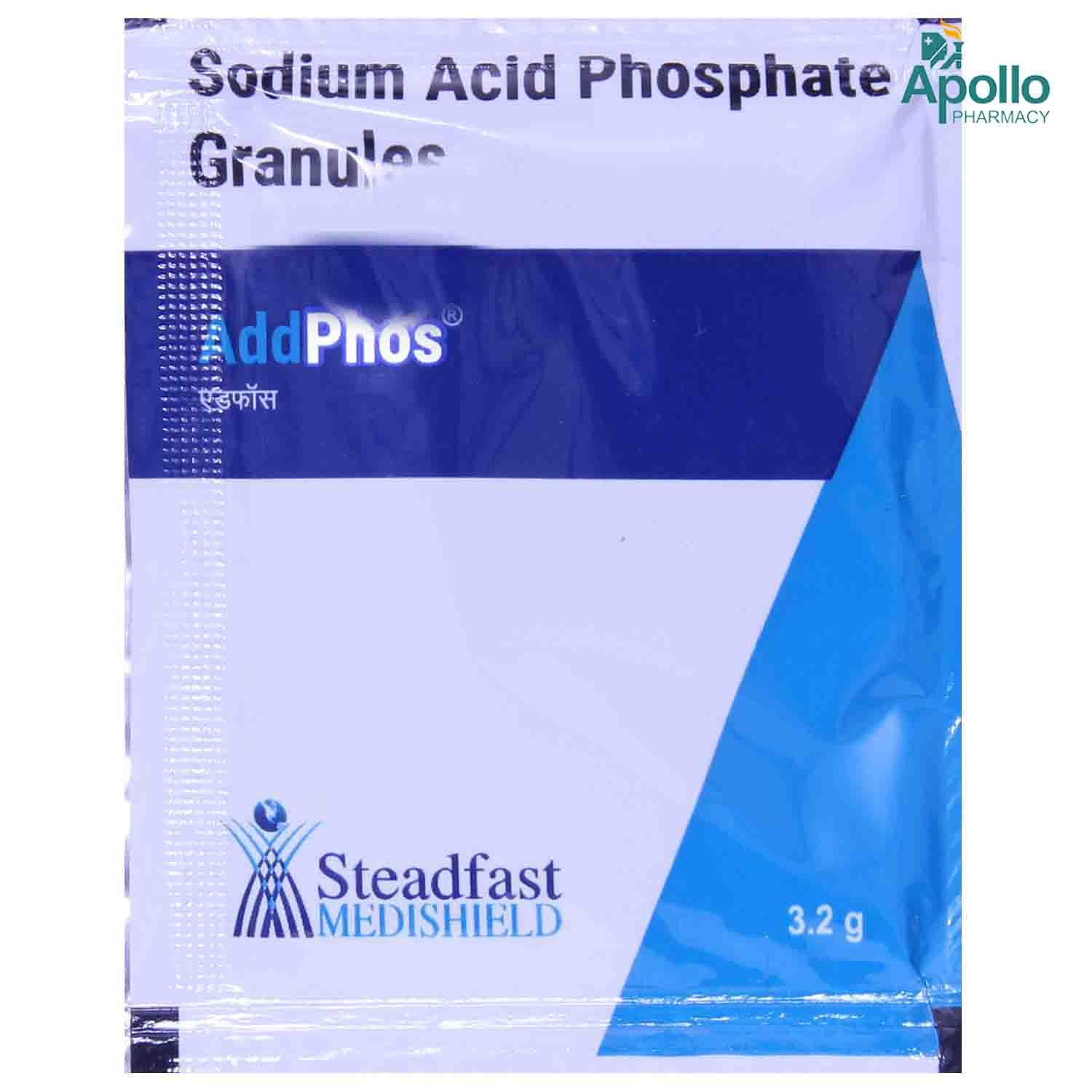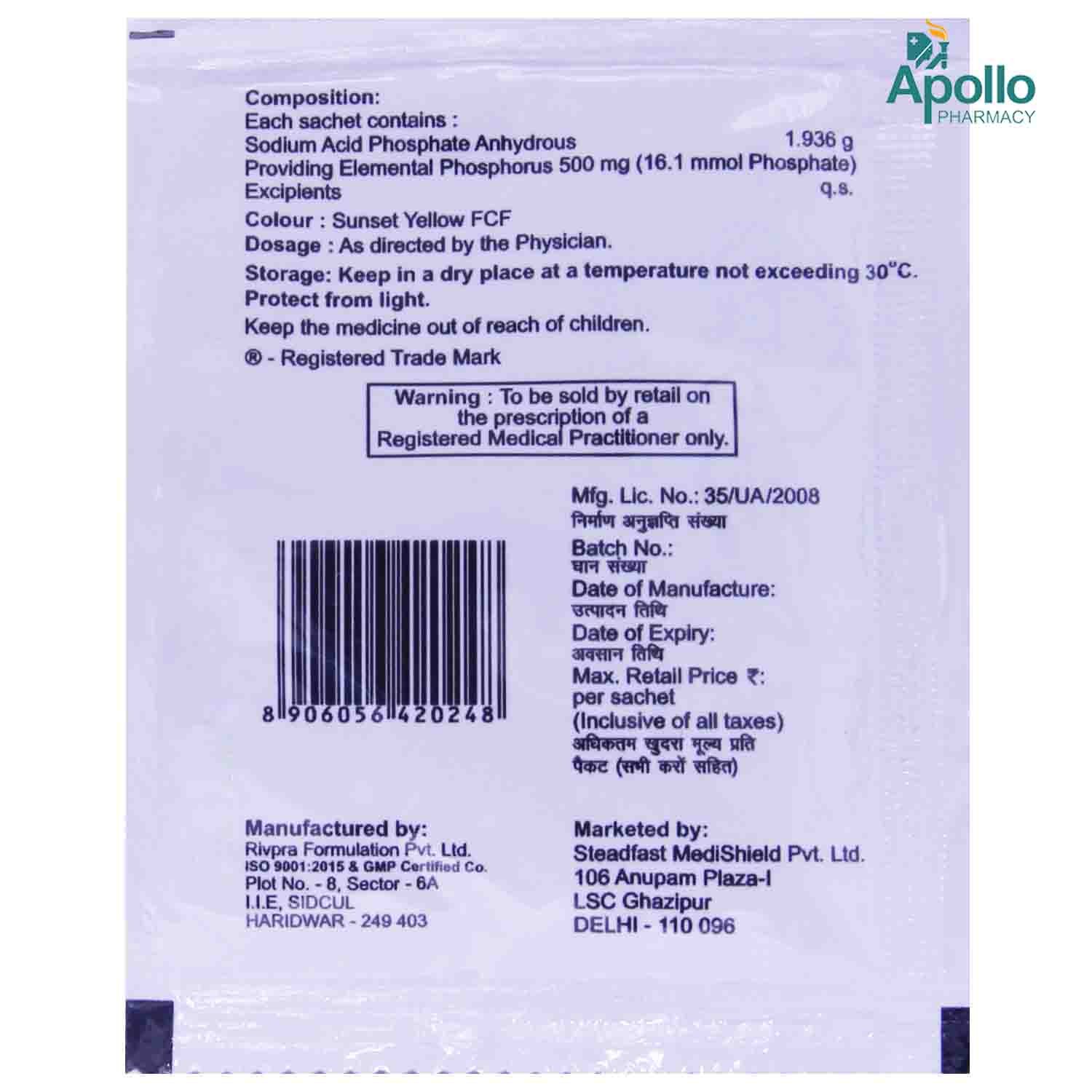Addphos Granules 3.2 gm
MRP ₹22.5
(Inclusive of all Taxes)
₹2.7 Cashback (12%)
Provide Delivery Location
Online payment accepted
 Prescription drug
Prescription drugWhats That
Composition :
Manufacturer/Marketer :
Consume Type :
Expires on or after :
Return Policy :
About Addphos Granules
Addphos Granules is used to treat high blood calcium levels caused by hyperparathyroidism (overactive parathyroid glands) and multiple myelomatosis (blood cancer). Additionally, Addphos Granules is also used to treat low blood potassium due to vitamin D resistant rickets (a bone disease that does not respond to vitamin D treatment) and vitamin D resistant hypophosphatemic osteomalacia (bone softening condition).
Addphos Granules contains ‘Sodium acid phosphate’, which binds with the calcium, this helps the calcium levels go back to normal. It also helps in increasing the levels of potassium in the blood. Thereby, Addphos Granules helps in treating high calcium and low potassium levels.
You are advised to take Addphos Granules for as long as your doctor has prescribed it for you, depending on your medical condition. In some cases, you may experience common side effects such as stomach upset, diarrhoea, abdominal pain, nausea, and vomiting. Most of these side effects do not require medical attention and will resolve gradually over time. However, you are advised to talk to your doctor if you experience these side effects persistently.
Consult a doctor before taking Addphos Granules if you are pregnant or breastfeeding. Addphos Granules should be given to children only if prescribed by a doctor. Inform your doctor if you are on sodium controlled diet or if you have reduced kidney function. Keep your doctor informed about your health condition and the medicines you are taking to rule out any side effects/interactions.
Uses of Addphos Granules
Directions for Use
Key Benefits
Addphos Granules is used to treat high blood calcium levels caused by hyperparathyroidism (overactive parathyroid glands) and multiple myelomatosis (blood cancer). Besides this, Addphos Granules is also used to treat low blood potassium due to vitamin D-resistant rickets (a bone disease that does not respond to vitamin D treatment) and vitamin D-resistant hypophosphatemic osteomalacia (bone softening condition). Addphos Granules binds with the calcium and makes the calcium levels go back to normal. It also helps in increasing the levels of potassium in the blood. Thereby, Addphos Granules helps in treating high calcium and low potassium levels.
Storage
Drug Warnings
Do not take Addphos Granules if you are allergic to any of its components. Talk to your doctor if you have congestive heart failure, high blood pressure, sodium restrictions in your diet, pre-eclamptic toxaemia (high blood pressure during pregnancy), kidney or liver disease. Consult your doctor before taking Addphos Granules if you are pregnant or breastfeeding. Addphos Granules should be given to children only if prescribed by a doctor.
Drug-Drug Interactions
Drug-Drug Interactions
Login/Sign Up
Drug-Food Interactions
Drug-Food Interactions
Login/Sign Up
Diet & Lifestyle Advise
- Maintain a well balanced diet containing fresh fruits, vegetables, and whole grains.
- Drink plenty of water. Staying hydrated lowers calcium levels and prevents kidney stones.
- Smoking can cause bone loss. Quit smoking.
- Exercise regularly as it helps promote bone health.
Side Effects of Addphos Granules
- Stomach upset
- Abdominal pain
- Nausea
- Vomiting
- Diarrhoea
Habit Forming
Therapeutic Class
All Substitutes & Brand Comparisons
RX
Out of StockFoslift Granules 3.2 gm
Mediart Life Sciences Pvt Ltd
₹22.5
(₹7.03/ 1gm)
13% COSTLIER
Author Details
We provide you with authentic, trustworthy and relevant information
Drug-Diseases Interactions
Drug-Diseases Interactions
Login/Sign Up
FAQs
Special Advise
- Regular monitoring of electrolyte levels while taking Addphos Granules is advised.
Disease/Condition Glossary
Hyperparathyroidism: The parathyroid glands become overactive and secrete too much parathyroid hormone. This leads to hypercalcemia, i.e., a rise in calcium levels in the blood. Symptoms include muscle pain, joint weakness, tiredness, loss of appetite, bone pain, nausea, vomiting, and constipation.
Multiple myelomatosis: It is a type of cancer in which the plasma cells become cancerous and multiply. Plasma cells are a type of white blood cells in the bone marrow. Multiple myelomatosis damages the bones, kidneys, immune system, and red blood cell count. Hypercalcemia is the most frequent metabolic complication of myeloma.
Vitamin D-resistant hypophosphatemic osteomalacia or rickets: It is a bone disease that does not respond to treatment with vitamin D. This condition is characterised by hypophosphatemia (low phosphorus levels in the blood), diminished intestinal absorption of calcium, and increased renal clearance of phosphate. It is a metabolic disease that leads to reduced mineralisation of the bone matrix.

Have a query?
Alcohol
Safe if prescribed
It is unknown if alcohol interacts with Addphos Granules . Please consult your doctor.
Pregnancy
Consult your doctor
Please consult your doctor if you are pregnant or if you have any concerns regarding this. Your doctor will prescribe only if the benefits outweigh the risks.
Breast Feeding
Consult your doctor
Please consult your doctor if you are breastfeeding or if you have any concerns regarding this. Your doctor will decide whether breastfeeding women can take Addphos Granules or not.
Driving
Safe if prescribed
Addphos Granules is unlikely to affect your ability to drive. However, drive or handle machinery only if you are alert.
Liver
Consult your doctor
Please consult your doctor if you have a liver impairment or any concerns regarding this.
Kidney
Consult your doctor
Addphos Granules contains potassium; this should be taken into consideration if you have lowered kidney function. Please consult your doctor if you have kidney impairment or any concerns regarding this.
Children
Safe if prescribed
Addphos Granules should be given to children only if prescribed by the doctor.








_0.jpg?tr=q-85)

